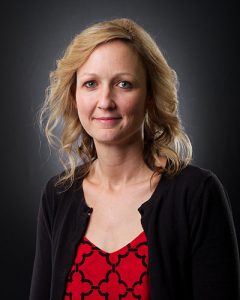 We recognized Jacksonville State University for offering one of the 35 Best ABA Graduate Programs (Master’s and Doctorate), adding them to our list of top recommendations for students in the area.
We recognized Jacksonville State University for offering one of the 35 Best ABA Graduate Programs (Master’s and Doctorate), adding them to our list of top recommendations for students in the area.
We were excited to hear from Paige McKerchar, a faculty member at Jacksonville State University who took the time to answer a few questions about how the school works to create a great student experience that helps prepare graduates for a career in applied behavior analysis.
Jacksonville State University Programs:
- M.S. in Psychology with an emphasis in Applied Behavior Analysis

Professor/Faculty Name: Paige McKerchar
Tell us about the types of students you see come through your program. Are you seeing more non-traditional students and career changers coming from other fields?
Paige: Our students are mostly traditional students, but we just accepted a local teacher who has her master’s degree in education but is looking to learn more about behavior analysis. We do expect to see more and more non-traditional students in the future, and we are taking a close look at our curriculum and scheduling to try to accommodate both traditional and non-traditional students.
What areas of practice are you seeing graduates going into? Do they tend to find jobs in the local school districts or more often join private practices?
Paige: Most of our graduates have taken jobs with local agencies providing behavioral services in residential, school, and clinic settings. We have also had a couple graduates eventually complete their master’s degrees in special education so that they could work in early intervention classrooms in school districts.
What are some of the things you love most about the ABA program at your university – the kind of things you’d like future students to know about as they consider their options?
Paige: Our faculty set us apart from other similar programs. At JSU, we have 4 BCBA-Ds in the Psychology Department and one basic behavior analyst with over 45 years of experience in the field. Four of these faculty regularly teach at the graduate level, and we all work together very closely to ensure students succeed. This is done by constantly monitoring students’ performances and by connecting them to the resources they need during their time in the program and after graduation. I think our faculty’s connections to local providers; state, regional, and national associations; and the state licensing board provide a unique opportunity and experience for students.
What do you feel are the most pressing issues in ABA today, and how does the program at your school prepare graduates to address these issues?
Paige: I think it is essential that graduate training programs ensure students leave with a solid background in and understanding of the foundations on which applied behavior analysis was built. It’s one thing to know howto implement behavioral treatments, but it’s a whole other thing to know why you’re implementing them. Students can only learn so much in two years, which is the average length of ABA training programs. At JSU, we stress the basic and theoretical foundations of ABA as well as experimental methods. If students leave us with these essential components, we are confident that they can build an effective assessment and treatment repertoire as they gain years of experience.
I also think it’s essential that students studying applied behavior analysis understand that the laws of behavior are thoroughgoing and that the principles can be applied to all behavior, not just maladaptive behavior exhibited by children with autism. To this end, our faculty have worked with graduate students on research studies in gerontology and our coursework emphasizes the breadth of applications of applied behavior analysis.
How does the MS in Psychology—ABA Emphasis program help students acquire professional credentials?
Paige: Our Graduate Program Coordinator guides students through the BACB’s supervision requirements beginning at orientation before they start the program and lasting until they apply for the exam. This guidance includes careful review of BACB-required paperwork received from off-campus supervisors while the student is completing a practicum and informal review of the activities students are completing at off-campus agencies. All students are required to take 2 semesters of practicum where they work at an approved, off-site agency that has a Licensed Behavior Analyst available to provide supervision.
We also offer some fellowship positions in which students work for a local agency receiving supervision and funding (i.e., hourly pay and tuition reimbursement) while they are in school, and then they in turn work for the agency at a reduced salary (equal to the regular salary minus the tuition costs) as a Licensed Behavior Analyst for a year or two following graduation. Most of our students graduate with enough supervision hours to sit for the BACB exam in August following graduation in early May.
What are some examples of local businesses that provide supervised practicum hours for ABA students?
Paige: We work with The Learning Tree, Inc., an agency that provides residential, school, preschool, and clinic services. We also have a number of students who work for and receive supervision from:
- Milestones Behavior Group, Inc. in Birmingham and surrounding areas where they provide clinic and school-based services.
- Smith Behavior Group, an agency out of the Auburn area providing in-home and school-based services in counties near JSU.
- Coosa Behavioral Services in the Gadsden area offering clinic, school, and in-home services.
Are prospective students required to hold an undergraduate psychology degree to apply for the MS degree?
Paige: Prospective students are not required to hold an undergraduate degree to apply for the M.S. degree, but we give priority to applicants with strong academic records AND undergraduate coursework in applied behavior analysis or experience working under a Board Certified Behavior Analyst.
Check out our full interview series here to see what other professors and faculty are saying about their ABA programs.





